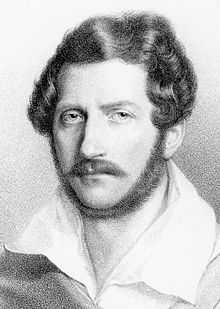Il giovedì grasso
Il giovedì grasso is a farsa in one act by Gaetano Donizetti, from a libretto by Domenico Gilardoni. The literal translation of the title is "Maundy Thursday," a reference to the Roman ecclesiastic calendar. The libretto was adapted from the French comedies Monsieur de Pourceaugnac by Molière and Le nouveau Pourceaugnac by Charles-Gaspard Delestre-Poirson and Eugène Scribe. The opera uses spoken dialogue rather than recitatives, and the buffo role is given in the Neapolitan language. The work premiered at the Teatro del Fondo in Naples on 26 February 1829.
Roles
| Role | Voice type | Premiere Cast, 26 February 1829 (Conductor: ) |
|---|---|---|
| Ernesto Rousignac | tenor | Giovanni Battista Rubini |
| Stefanina | soprano | Rosalinda Grossi |
| Nina | contralto | Adelaide Comelli-Rubini |
| Sigismondo | bass | Luigi Lablache |
| The Colonel | baritone | Giovanni Battista Campagnoli |
| Teodoro | tenor | Giovanni Arrigotti |
| Camilla | mezzo-soprano | Maria Carraro |
| Cola | bass | Giovanni Pace |
| Knights of the queen, domestic servants of Leicester, guards, soldiers, people | ||
Synopsis
- Time: 17th century
- Place: "A house in the country, outside Paris"[1]
The lovers Nina and Theodore are desperate since Nina is promised to Ernesto, a simple village boy. Sigismondo, who is in his private life jealous of his own wife for false suspicions and believes that Ernesto is a fool, is their friend and decides to help them. Knowing that Ernesto will come exactly when Nina's father, the Colonel, will be in Paris, offers everyone to dress up like in "Cruel Thursday of abundance": He himself will be an imaginary friend from Ernesto's past and Camilla will be a former lover betrayed by Ernesto. Stephanina, who isn't familiar with Ernesto, is the one who opens the door to Ernesto and innocently tells him about the people and their scheme. Ernesto decides to fight back, refers to Sigismondo as to his friend and to Camilla as his former and betrayed lover, which allegedly confirms Sigismondo's suspicions. He also sends an urgent letter to the Colonel asking him to return home as soon as possible. Only when the Colonel is back Ernesto confesses to everyone that he, the simple village boy, is the one who had fooled them and let the lovers get married.
Recordings
| Year | Cast (The Colonel, Nina, Teodoro, Sigismondo) |
Conductor, Opera House and Orchestra |
Label[2] |
|---|---|---|---|
| 1970 | Federico Davià, Jill Gomez, Malcolm Williams, Elfego Esparza |
David Atherton, Radio Teflis Éireann Symphony Orchestra (A recording of a performance at the Wexford Festival) |
Audio CD: Foyer Cat: 1-CF 2036, Memories Cat: HR 4482 |
| 1971 | Saturno Meletti, Mariella Devia, Antonio Bevacqua, Giorgio Gatti |
Ottavio Ziino, Orchestra Aidem di Firenze |
33rpm LP: Voce Cat: 110 |
References
Notes
- ↑ Osborne 1994, p. 181
- ↑ Source for recording information: Recording(s) of Il giovedì grasso on operadis-opera-discography.org.uk
Sources
- Allitt, John Stewart (1991), Donizetti: in the light of Romanticism and the teaching of Johann Simon Mayr, Shaftesbury: Element Books, Ltd (UK); Rockport, MA: Element, Inc.(USA)
- Ashbrook, William (1982), Donizetti and His Operas, Cambridge University Press. ISBN 0-521-23526-X
- Ashbrook, William (1998), "Donizetti, Gaetano" in Stanley Sadie (Ed.), The New Grove Dictionary of Opera, Vol. One. London: MacMillan Publishers, Inc. ISBN 0-333-73432-7 ISBN 1-56159-228-5
- Ashbrook, William and Sarah Hibberd (2001), in Holden, Amanda (Ed.), The New Penguin Opera Guide, New York: Penguin Putnam. ISBN 0-14-029312-4. pp. 224 – 247.
- Black, John (1982), Donizetti’s Operas in Naples, 1822—1848. London: The Donizetti Society.
- Loewenberg, Alfred (1970). Annals of Opera, 1597-1940, 2nd edition. Rowman and Littlefield
- Osborne, Charles, (1994), The Bel Canto Operas of Rossini, Donizetti, and Bellini, Portland, Oregon: Amadeus Press. ISBN 0-931340-71-3
- Sadie, Stanley, (Ed.); John Tyrell (Exec. Ed.) (2004), The New Grove Dictionary of Music and Musicians. 2nd edition. London: Macmillan. ISBN 978-0-19-517067-2 (hardcover). ISBN 0-19-517067-9 OCLC 419285866 (eBook).
- Weinstock, Herbert (1963), Donizetti and the World of Opera in Italy, Paris, and Vienna in the First Half of the Nineteenth Century, New York: Pantheon Books. LCCN 63-13703
